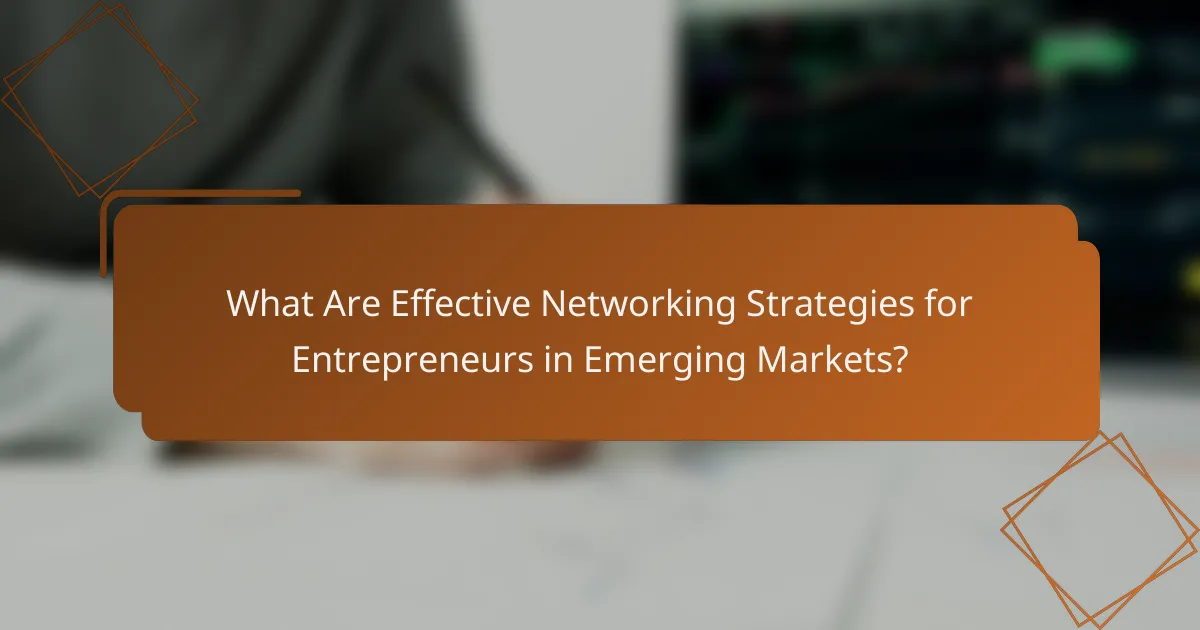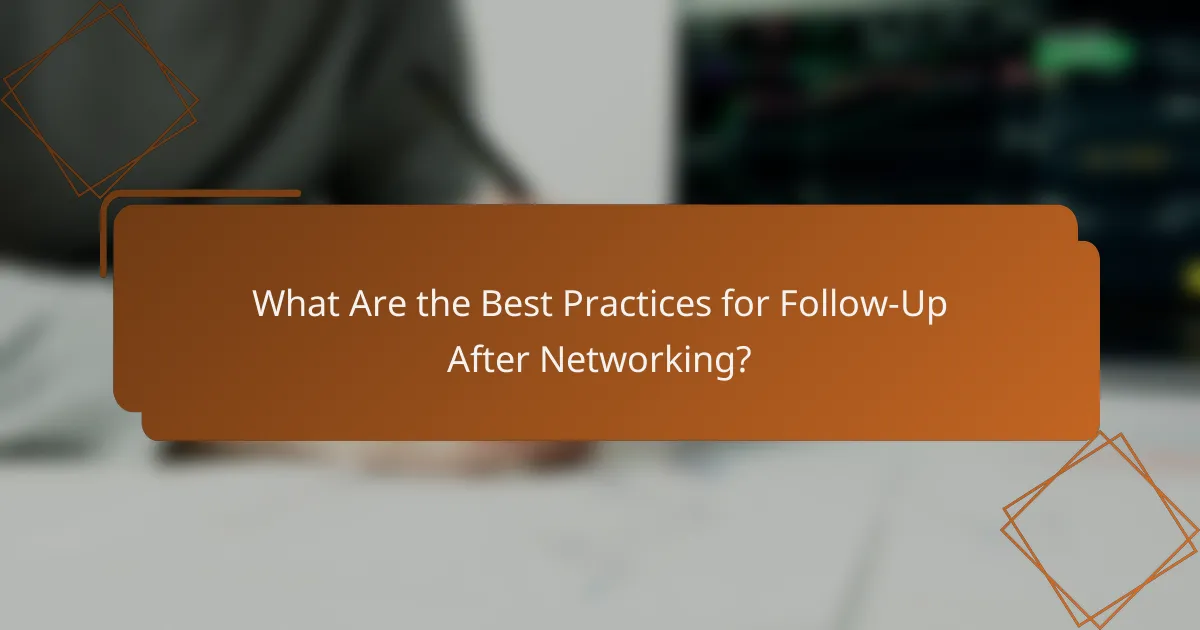In emerging markets, effective networking strategies are vital for entrepreneurs seeking to build relationships and drive business growth. By leveraging local connections, embracing technology, and engaging in community activities, entrepreneurs can access valuable resources and insights. Establishing trust through personal relationships and cultural awareness further enhances these networking efforts, creating a strong foundation for success.

What Are Effective Networking Strategies for Entrepreneurs in Emerging Markets?
Effective networking strategies for entrepreneurs in emerging markets involve building relationships through local connections, leveraging technology, and participating in community activities. These approaches help entrepreneurs access resources, gain insights, and foster collaborations that can drive business growth.
Leveraging Local Business Associations
Local business associations are vital for entrepreneurs in emerging markets as they provide a platform for networking and collaboration. Joining these associations can offer access to valuable resources, mentorship, and industry insights that are specific to the local market.
To maximize benefits, actively participate in meetings and events, and consider taking on leadership roles. This involvement can enhance visibility and credibility within the business community.
Utilizing Social Media Platforms
Social media platforms are powerful tools for networking in emerging markets, allowing entrepreneurs to connect with potential clients, partners, and industry leaders. Platforms like LinkedIn, Facebook, and Instagram can be used to share insights, showcase products, and engage with a broader audience.
Focus on creating valuable content that resonates with your target audience. Regularly interact with followers and join relevant groups to expand your network and establish authority in your field.
Participating in Trade Shows
Trade shows offer entrepreneurs in emerging markets a unique opportunity to showcase their products and services while networking with industry peers. Attending these events can lead to valuable connections and insights into market trends.
Prepare by researching exhibitors and attendees in advance, and set clear objectives for what you want to achieve. Bring marketing materials and be ready to engage in meaningful conversations that can lead to partnerships or sales.
Building Strategic Partnerships
Strategic partnerships can significantly enhance an entrepreneur’s reach and capabilities in emerging markets. Collaborating with other businesses can provide access to new customers, shared resources, and complementary skills.
Identify potential partners whose strengths align with your business goals. Approach them with a clear value proposition and be open to mutually beneficial arrangements that can foster long-term relationships.
Engaging in Community Events
Community events are excellent opportunities for entrepreneurs to network and build relationships within their local markets. Participating in or sponsoring local events can increase visibility and demonstrate commitment to the community.
Consider hosting workshops, seminars, or charity events that align with your business values. This engagement can help establish trust and rapport with potential customers and partners, ultimately leading to business growth.

How Can Entrepreneurs Build Trust in Emerging Markets?
Entrepreneurs can build trust in emerging markets by focusing on personal relationships, cultural awareness, and providing value upfront. Establishing a strong foundation of trust is essential for successful networking and business growth in these regions.
Establishing Personal Relationships
Building personal relationships is crucial in emerging markets, where business often hinges on trust and familiarity. Entrepreneurs should invest time in face-to-face meetings, social gatherings, and community events to foster connections.
Consider scheduling regular check-ins or informal lunches with potential partners or clients. This approach not only strengthens relationships but also helps in understanding local business practices and expectations.
Demonstrating Cultural Awareness
Cultural awareness plays a significant role in establishing trust. Entrepreneurs should familiarize themselves with local customs, traditions, and business etiquette to show respect and understanding.
For example, in many cultures, greetings and small talk are essential before diving into business discussions. Taking the time to learn about local holidays, traditions, and even language basics can significantly enhance rapport.
Offering Value Before Asking
Providing value before making requests is a powerful strategy for building trust. Entrepreneurs should look for opportunities to help others without expecting immediate returns, such as sharing insights, resources, or connections.
For instance, offering free workshops or consultations can showcase expertise and goodwill. This approach not only builds credibility but also encourages reciprocity, leading to stronger business relationships over time.

What Role Does Technology Play in Networking?
Technology is crucial in modern networking, especially for entrepreneurs in emerging markets. It facilitates connections, streamlines communication, and enhances relationship management, making networking more efficient and accessible.
Using Networking Apps
Networking apps are designed to help entrepreneurs connect with potential partners, clients, and industry peers. Popular platforms like LinkedIn, Meetup, and Bumble Bizz allow users to create profiles, share experiences, and find networking events tailored to their interests.
When choosing a networking app, consider its user base and features. For instance, LinkedIn is ideal for professional connections, while Meetup is great for local events. Always ensure the app aligns with your networking goals and target audience.
Implementing CRM Systems
Customer Relationship Management (CRM) systems are essential for managing interactions and relationships with potential and existing clients. Tools like Salesforce, HubSpot, and Zoho CRM help entrepreneurs track contacts, schedule follow-ups, and analyze networking efforts.
When implementing a CRM, focus on user-friendliness and integration capabilities with other tools. A well-structured CRM can enhance your networking strategy by providing insights into client preferences and engagement patterns, ultimately leading to stronger relationships.
Utilizing Virtual Meeting Tools
Virtual meeting tools such as Zoom, Microsoft Teams, and Google Meet have transformed how entrepreneurs network, especially in regions where travel may be limited. These platforms enable face-to-face interactions from anywhere, making it easier to connect with international partners.
To maximize the effectiveness of virtual meetings, ensure you have a stable internet connection and a professional background. Schedule meetings at convenient times for all parties involved, and consider using features like screen sharing to enhance presentations and discussions.

What Are the Challenges of Networking in Emerging Markets?
Networking in emerging markets presents unique challenges that can hinder business growth. Key obstacles include navigating complex regulatory environments, understanding diverse cultural norms, and dealing with limited resources.
Understanding Regulatory Environments
Regulatory environments in emerging markets can be unpredictable and vary significantly from one country to another. Entrepreneurs must familiarize themselves with local laws, trade regulations, and compliance requirements to avoid legal pitfalls.
For example, some countries may have strict import/export regulations or require specific licenses for certain industries. Engaging with local legal experts or business consultants can provide valuable insights and help navigate these complexities.
Navigating Cultural Differences
Cultural differences can greatly impact networking effectiveness in emerging markets. Understanding local customs, communication styles, and business etiquette is crucial for building trust and rapport with potential partners.
For instance, in many cultures, relationship-building precedes business discussions. Entrepreneurs should invest time in socializing and establishing personal connections before delving into formal negotiations.
Overcoming Limited Resources
Limited resources, including financial constraints and access to technology, can pose significant challenges for entrepreneurs in emerging markets. Networking often requires investment in time and money, which may be scarce.
To overcome these limitations, entrepreneurs can leverage low-cost networking opportunities such as local business events, online platforms, and community groups. Collaborating with other businesses can also help share resources and expand networking reach.

How to Measure Networking Success?
Measuring networking success involves assessing the effectiveness of connections and partnerships in achieving business goals. Key indicators include the quality of referrals, the outcomes of collaborations, and the growth of brand awareness.
Tracking Referral Sources
Tracking referral sources helps identify which networks and contacts are most effective in generating leads. Utilize customer relationship management (CRM) tools to log where referrals originate, categorizing them by source, such as social media, events, or direct introductions.
Regularly analyze this data to determine which sources yield the highest conversion rates. For example, if referrals from industry events lead to more sales than those from social media, prioritize your networking efforts accordingly.
Evaluating Partnership Outcomes
Evaluating partnership outcomes involves assessing the results of collaborations with other businesses. Set clear objectives for each partnership, such as revenue targets or market expansion goals, and measure progress against these benchmarks.
Consider using metrics like joint sales figures or customer acquisition rates to gauge success. If a partnership consistently falls short of expectations, it may be time to reassess or pivot your strategy.
Assessing Brand Awareness Growth
Assessing brand awareness growth is crucial for understanding how networking impacts your market presence. Use surveys, social media engagement metrics, and website traffic analytics to track changes in brand recognition over time.
For instance, if you notice a significant increase in social media followers or website visits after attending a trade show, this indicates successful networking efforts. Regularly review these metrics to refine your networking strategies and enhance brand visibility.

What Are the Best Practices for Follow-Up After Networking?
Effective follow-up after networking is crucial for building lasting business relationships. Best practices include timely communication, personalized messages, and clear next steps to foster engagement.
Sending Thank You Notes
Sending thank you notes is a fundamental practice that reinforces connections made during networking. A well-crafted note expresses gratitude and keeps you top of mind for future opportunities.
Consider sending your thank you notes within 24 to 48 hours after the initial meeting. This promptness shows your enthusiasm and respect for the other person’s time. Personalize each note by referencing specific topics discussed to make it more meaningful.
When crafting your note, keep it concise and professional. A simple structure can include a thank you, a mention of a shared interest, and an invitation to connect again. For example, “Thank you for our conversation about sustainable business practices. I would love to explore this further over coffee next week.” This approach encourages ongoing dialogue and collaboration.
